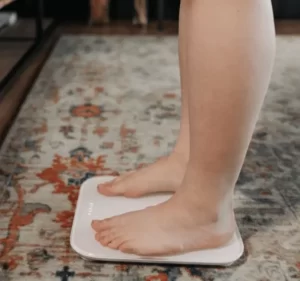“Why am I gaining weight?” is a very common question people ask themselves. So you’ve been sweating it out at the gym 6 days a week for a month now and it all comes down to this moment of you standing on the scale and measuring your weight, you look down and you see that you’ve gained weight. You must be wondering how that could have happened after such a hard month of trying to lose some weight.
It is advised to know the type of weight gain to handle it appropriately. We go on to discuss the most common reasons that are making you gain weight and how you can deal with them efficiently.
Excessive muscle fuel
The sugar that helps run your body and fuels your muscles may also be one of the reasons for weight gain. The glycogen is converted to glucose by the muscle cells which is the main source of energy for the muscles. In the beginning, while your body is still getting used to the workouts it tends to store more glycogen in the body.
This sugar to get stored binds with water thus retaining more water in your body, and as your muscles get used to you working out they become more efficient and require less glycogen in the end needing less water to store it.
Muscle fiber tear
When you consider shedding some weight and begin to lift heavy weights in the gym, it is of crucial importance to note as your body is getting adjusted to this new routine of you lifting weights, the muscle fibers start to tear also called the micro tear, this along with inflammation or also called swelling all over the area causing a general increase in weight.
Resting between workouts is highly recommended as it is a direct remedy. Drinking green tea and eating pineapple are useful as they are anti-inflammatory.
Muscle fiber healing
Now that you have managed to cause muscle tear this leads to water retention in the area which might be one of the reasons for weight gain, and this is the reason why you’re advised to not overdo it in the beginning, generally they tend to disappear in a week or two.

Another reason though unlikely to take place at the beginning of your journey, but may occur especially in men would be that repairing of old torn muscle tissue is taking place or stronger and thicker muscle fibers start to form to replace the torn fibers gaining you some muscle ultimately leading to weight gain.
Stress
Mentally stressing yourself by thinking about multiple ways to lose weight or any other stress you might encounter in your day-to-day life might be one of the reasons for your weight gain as it promotes the release of the hormone called “cortisol”.
Cortisol released from your adrenal glands causes fat and carbohydrate metabolism, increases your appetite, and also makes you crave more unhealthy foods like sweets.
This hormone causes impulsive eating also known as stress eating. This can be dealt with by relaxing your body, laughing more, performing meditations and yoga asanas, eating fish, dark chocolate, eggs, and drinking green tea.
Unhealthy calories
Food quality is equally as important as quantity. You might be thinking that you’re consuming relatively fewer calories as compared to before, but it is also important to keep a check on what you’re eating. For example, if you’re just eating 2 unhealthy greasy burgers a day, it still adds to your weight as it is calorie dense in the first place and unhealthy at the same time.
It is ok to treat yourself once here or there but not regularly. It is also always good to limit sugar. Eating mono and poly saturated fats and staying away from trans fats is essential.
Post-workout carbohydrates
The sugars that are lost during a workout are replenished during your post-workout meal and these carbohydrates tend to retain 3 times more water again leading to a gain in weight.
Consumption of high amount of calories
You are not tracking the food you eat. It is really hard to burn calories and you might not be burning as much as you think you are burning. You might end up consuming way more calories than you burning and this can be one of the reasons for your gain in weight. To solve this problem it is good to use a calorie calculator.
Undigested food
After your workouts, you are extremely hungry and you replenish by eating a lot of healthy protein and fiber-rich food. The fiber in your food causes water retention in your colon making you weigh heavy before passing stools.
Slower metabolism
You might not know it and you might have been doing everything right to see a change in your weight, cut down on calories, and worked out hard but you weigh the same. This might be due to your slow metabolic rate which causes calories to be burnt at a very slow rate as compared to a lean person.
Less protein intake
As proteins affect your hunger hormones, they drastically decrease the amount of food consumed by you, reduce cravings and increase your metabolism. It is usually suggested to have a breakfast rich in protein to decrease your appetite for the rest of the day.
You’re not performing cardio
Cardio also known as cardiovascular exercises like jogging, running, squats, walking, swimming, and jump rope is an exercise that helps increase your heart rate and plays a very vital role in burning fat. A 30-minute cardio session is necessary along with strength training exercises.
You have a medical condition that slows the weight loss process
A multitude of medical conditions may lead the way to your gaining weight and making it hard for you to lose weight. A few of these include Hypothyroidism, menopause, polycystic ovarian syndrome (PCOS) seen in females, and other conditions like congestive heart failure and depression.
You are not drinking enough water
Drinking a lot of water is very beneficial in your goal of losing weight since water is calories free it reduces your calorie intake and the risks of weight gain. You are advised to drink more water than usual while working out to stay hydrated.
You are skipping meals
You might think that skipping meals and starving yourself might be the way to lose weight. At the end of the day when you have your meal, your body feels the need to convert the sugars into fats and store them as it gets used to you starving yourself and this invariably leads to weight gain.

It is of utmost importance to eat 3 meals a day with properly balanced food. Hence it is advised to have regular meals with fewer calories sufficient enough to supply energy to your body.
You are consuming alcohol
If you like alcohol, though it is not good for your health, it is best to stay away from beer and wine as they cause weight gain being rich in calories. Stick to spirits with zero-calorie beverages. But still, heavy drinking is linked to weight gain.
The liver takes almost 45 days to saturate alcohol, especially when consumed raw. If you are savouring junk food, this might overload the liver, which will hinder your weight loss.
You are not lifting weights
Cardio is vital to losing weight and so is weight training. Cardio usually tends to increase your metabolism thus increasing your appetite and causing more calories to be consumed, on the other hand, weight lifting counteracts it, moreover when you gain muscle by lifting weight you burn a lot more calories at rest.
This burn in calories occurs due to an increase in the lean muscle causing an increased metabolic rate, unlike stored fat tissue.
You have been dieting for a long time now
If you have been dieting since a while ago, chances are you have hit the weight loss plateau and this might suggest that you need to take a break now, for a month or two. Try increasing your calories by about 5% to 10%, sleep well, and lift weights.
Type of diet you follow
The kind of diet you follow plays a major role in your journey of weight loss. Diets like liquid or juice diets especially inspired by social media will surely give you results. But the question here is, are the results sustainable? the answer is a big NO.
The loss of weight you notice here is mostly the water weight. Furthermore, after a few days or at the end of the diet, you will eat more than usual. This will eventually make you gain more weight than you lost.
You are unable to sleep
Multiple studies have associated low quality sleep (Insomnia and working late night shifts) might as well be one of the reasons for you gaining weight, as it causes deposition of fats exhaustion and depletion of muscle.

CONCLUSION
It is very important to bear in mind that this gain in weight is merely temporary and you do not have to get demotivated. And to answer your question on how long temporary weight gain after exercise lasts? It can last anywhere from 2 to 3 weeks to a month.
When your main goal is to lose weight, it is really important to keep in your mind not to set yourself unrealistic goals. It is not necessary to keep checking your weight on the weighing scale as it is unable to show the amount of fat or muscle in your weight, therefore, defeating the purpose of the goal to lose fat and gain muscle
It is a good idea to sometimes check the measurements of your waist or use a body fat percentage calculator. It could more likely be a combination of the factors stated above. Nevertheless, sticking to your regular workout regimen is always advised.
